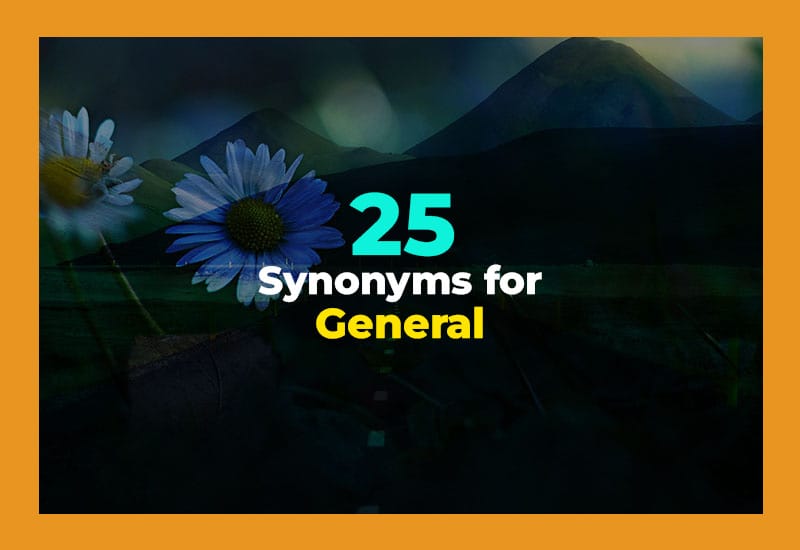You know that feeling when you get stuck using the same word over and over? It can be super boring, right? Well, today, I’m here to make your life a little easier! Instead of always using “general,” let’s explore 25 different ways to say it. Trust me, once you start using these synonyms, you’ll sound way more interesting, and your conversations will definitely get a boost.
1. Broad
When you want to describe something that covers a large area or includes many things, “broad” is a great choice. It’s often used when you’re talking about something with a wide scope. For example, if you say, “He has a broad knowledge of history,” you’re saying that his knowledge isn't limited to just a few subjects. It covers many different areas. You could also use “broad” to describe a broad street, which is wide and has lots of space, rather than a narrow one.
2. Overall
“Overall” is used when you are talking about something in the big picture or from a general viewpoint. For instance, if someone says, “The overall performance of the team was great,” they are referring to how the team did in general, not focusing on specific players. It’s an easy word to use when you’re summarizing a lot of smaller details. For example, after a busy day at work, you might say, “The overall mood in the office was positive.”
3. Universal
“Universal” refers to something that applies to everyone or everything, without exception. It's used when something is widely accepted or true. For example, “Respect is a universal value,” means that respect is important to everyone, no matter where you're from. If you want to say something applies to all situations, you might use “universal.” For example, “The universal truth is that we all need food to survive.”
4. Common
“Common” refers to something that happens often or is shared by many people. It can also mean something that’s normal or typical. For example, “It’s common for people to drink coffee in the morning.” This means drinking coffee in the morning happens often. Or, you might say, “He made a common mistake,” meaning it’s a mistake many people make. Using “common” is a great way to explain things that aren't rare or unusual.
5. Regular
“Regular” is used to describe something that happens consistently or in a predictable way. It can refer to events or activities that happen routinely. For example, “She has a regular exercise routine,” means she works out regularly. Or, if you want to say that something is typical or usual, you could say, “It was just a regular day at the office.” It's the perfect word when you want to talk about things that happen every day.
6. Standard
When something follows an accepted level or expectation, “standard” is a good synonym for “general.” It describes something normal, expected, or typical. For example, “The standard size for a coffee cup is 8 ounces,” means that 8 ounces is what most coffee cups are. Or, when you hear “a standard procedure,” it refers to the usual or expected way of doing something. So, next time something is usual or routine, consider using “standard.”
7. Typical
“Typical” is great when you want to talk about something that is normal or expected in a certain situation. For example, “It's typical for him to be late,” means that he often shows up late. If you’re describing something that fits the usual pattern, you could say, “A typical day for me involves working from 9 to 5.” It’s easy to use when you’re describing what usually happens.
8. Basic
When something is simple or straightforward, “basic” is a great synonym. For example, if you say, “She wore a basic black dress,” you're describing something simple, with no fancy details. It can also be used to describe the simplest form of something. For example, “The basic rules of the game are easy to understand,” means the core rules are simple. So if you want to keep it simple, use “basic.”
9. Primary
“Primary” refers to something that is most important or comes first in order. For example, if someone says, “The primary goal of the project is to improve efficiency,” they mean it's the most important thing to focus on. You could also say, “The primary reason I moved was for work,” meaning the main reason. It's perfect for when you want to focus on the most important part.
10. Typical
"Typical" is another good synonym for "general," as it describes something usual or expected. For example, “It was a typical Monday morning, with everyone running late.” It helps you describe things that follow the usual pattern or trend. Or, you might say, “A typical summer day involves trips to the beach,” meaning that trips to the beach happen often in the summer. So, when you’re talking about what usually happens, use “typical.”
11. Inclusive
When you describe something that includes many different types or groups, “inclusive” is a perfect synonym. For instance, “The event was inclusive, welcoming people from all backgrounds,” means that people of all types were included. You can also use “inclusive” when referring to things that are not exclusive. For example, “The course is designed to be inclusive of all learning styles,” meaning it works for everyone. It’s an easy way to show that something covers a wide range.
12. Broad
“Broad” is another great word to use when you want to describe something large or wide-reaching. For example, “The company has a broad range of products,” means they offer a lot of different items. You can also say, “Her broad knowledge of the subject made her a great teacher,” meaning she knew a lot about many aspects. So, when you want to talk about something that includes a lot of things, “broad” is a good choice.
13. Sweeping
“Sweeping” is often used when you want to describe something that has a wide or far-reaching effect. For example, “The sweeping changes in the company affected all employees,” means the changes impacted everyone. Or, you might say, “The sweeping view of the mountains was breathtaking,” meaning you could see a large area. If something covers a wide area or has a big influence, “sweeping” is a great word to use.
14. Expansive
“Expansive” describes something that is large in size or scope. For example, “The expansive desert stretched for miles,” means the desert covered a huge area. You can also use it when talking about something that has a broad range, like, “She has an expansive knowledge of literature,” meaning she knows a lot about many different kinds of books. It's a great word for when you want to describe something that seems endless or wide.
15. Large-scale
“Large-scale” is perfect when you're talking about something that is big or involves many things. For example, “The large-scale project involved hundreds of workers,” means it was a huge effort. You could also say, “The large-scale event attracted thousands of people,” meaning the event was very big. So, if you’re describing something big and far-reaching, “large-scale” is a perfect synonym.
16. Far-reaching
When you want to say something has a wide effect or influence, “far-reaching” is a great word. For example, “The far-reaching consequences of the decision were felt by everyone,” means the decision affected many people. Or, “Her far-reaching impact on the community was undeniable,” means she influenced many areas. It's a great word for describing things that spread out over a large area.
17. Widespread
“Widespread” is used to describe something that is common or found over a large area. For example, “The widespread use of smartphones has changed how we communicate,” means smartphones are used by a lot of people. You could also say, “The widespread popularity of the show made it a huge hit,” meaning many people loved it. So, when something is found or done by many people, “widespread” is a good synonym.
18. Extensive
“Extensive” refers to something large in amount, range, or degree. For example, “She did extensive research before writing her paper,” means she researched a lot of information. Or, you could say, “The extensive renovations made the house look brand new,” meaning the changes were big. It’s a great word to use when you want to describe something thorough or large.
19. Inclusive
“Inclusive” refers to something that includes everything or everyone. It's used when you want to talk about things that involve many different types of people or items. For example, “The museum's collection is inclusive of all art forms,” means the museum has a variety of artwork. Or, you might say, “Her approach to teaching was inclusive of all students,” meaning all students felt welcome. It's a helpful synonym when talking about things that aren’t limited.
20. All-encompassing
“All-encompassing” means something that includes everything. For example, “The all-encompassing guide covered all aspects of the topic,” means the guide explained everything about it. Or, “His all-encompassing attitude helped the team succeed,” means he was open to all ideas. It's a great word to use when you want to describe something that covers everything in a specific area.
21. Generalized
“Generalized” is often used when you talk about something that isn’t detailed or specific. For example, “The generalized statement didn't explain the problem in detail,” means it was too vague. Or, you might say, “The generalized rules were too broad for the situation,” meaning they didn’t apply well. Use “generalized” when you want to talk about something in simple, broad terms.
22. Simplified
“Simplified” means something that has been made easier to understand. For example, “The teacher gave a simplified explanation of the problem,” means she made it easier to understand. Or, “The simplified version of the report helped everyone understand the results,” means the report was made clearer. It’s a good word when you want to talk about making something more straightforward.
23. Uncomplicated
“Uncomplicated” describes something that is simple and easy to understand. For example, “The uncomplicated solution was the best one,” means the simple option worked best. Or, you might say, “She prefers uncomplicated tasks,” meaning she likes tasks that are easy. It's a great word for when you want to describe something without complexity.
24. Straightforward
“Straightforward” is used when you want to describe something clear and easy to follow. For example, “Her straightforward explanation made everything clear,” means her explanation was simple and to the point. Or, you could say, “The straightforward approach saved a lot of time,” meaning it was simple and effective. It’s perfect when something doesn't involve extra details.
25. Clear-cut
“Clear-cut” refers to something that is simple and well-defined. For example, “The clear-cut instructions made assembling the furniture easy,” means the instructions were simple and clear. Or, “The decision was clear-cut,” means there was no confusion about what should be done. It's a great word to use when you want to describe something that is straightforward and easy to understand.

I hope this list of synonyms for “general” helps you improve your vocabulary and sound even more interesting in your conversations! Now you can pick from a variety of words depending on the situation, whether you’re describing something broad, typical, or simple. It's fun to learn new words, and these can be used in so many everyday situations. Keep practicing, and soon you'll be using these words without even thinking about it!









